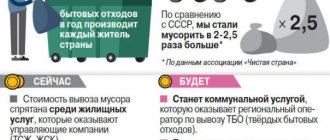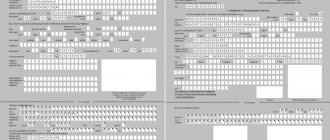Garbage collection in the village has become a standard public service since 2021. Residents of houses pay for the work of the waste management operator in the same way as they pay for electricity, gas and water. There is only one difference - if we can not use water and light and, accordingly, do not pay for unspent resources, then we will have to pay for garbage removal in any case, even if you process most of it into compost or destroy it in another way.
Payment for waste removal services is the responsibility of every citizen of the Russian Federation, since payment is calculated in most cases according to the number of people living in the house, and very rarely - according to the number of square meters of living space or the volume of waste. Services for waste removal from individual housing construction territories are provided by special licensed companies - regional operators with whom municipal authorities enter into contracts.
How to pay for garbage removal services in a private home
Payment for services for the removal of solid municipal waste by citizens living in rural areas is made in two ways - the choice of option depends on the person who has entered into an agreement with the regional operator for the provision of services:
- If the management company is engaged in organizing the removal, payment is made according to a general receipt, in which the amount for the corresponding service is displayed on a separate line;
- If the contract with the relocation operator was concluded by the owner of the property, then payment is made monthly on a separate receipt.
It’s more convenient and faster to pay online by registering a personal account on the regional operator’s website
How to conclude an agreement for waste removal from a private household
The standard form of an agreement for the provision of services for the removal of solid waste is presented in paragraph 5 of Article 24.7 of Law No. 89-F3. The contract must indicate:
- Name and details of the organization that is a regional operator for the removal of municipal waste, its legal address.
- Passport data of the customer of the service - last name, first name, patronymic, place of registration and residential address.
- Responsibilities of the operator's organization (collection, transportation, processing, neutralization, disposal and disposal of waste), collection location and scope of work performed. The operator’s responsibilities also include timely response to customer complaints about improper performance of services, monitoring the safety of containers and the condition of container sites.
- Responsibilities of the customer: payment for the service on time according to the tariff established by the local executive committee, storage of waste strictly in the places provided for this, responsibility for the safety of containers, etc.
- The exact location of the waste storage area along with a diagram, as well as an indication of the type of storage (bags, bins, containers, bunkers, etc.).
- The opportunity for the customer and the contractor to verify, record and control the services provided once every six months.
- Duration of the contract. As a rule, the contract is valid as long as the agreement between the service operator and the municipal authorities is in force.
- Place and time of conclusion of the contract.
- Signatures of all parties.
Sample contract for solid waste removal (page 1) Sample contract for solid waste removal (page 2) Sample contract for solid waste removal (page 3)
According to the new law, the MSW removal operator appointed on a competitive basis is required to submit an exact layout of waste collection points to local authorities, and any homeowner has the right to access this layout, indicating the nature and volume of storage areas for review purposes. This point was created to control and prevent the formation of spontaneous landfills and unauthorized waste disposal.
What the Law says about waste removal from the private sector
In Russia there is no special law controlling the scope of waste removal in rural areas. Clients and providers are guided by the rules prescribed in several legislative acts:
- Letter of the Ministry of Natural Resources and Ecology of the Russian Federation No. 08-25-53/24802 “On sending clarifications on the issue of regulating activities in the field of MSW management” dated November 11, 2019;
- Federal Law No. 7 “On Environmental Protection” dated January 10, 2002 (as amended on December 27, 2019);
- “Rules for the management of municipal solid waste” (MSW), introduced by the Decree of the Government of the Russian Federation of November 12. 2021 No. 1156;
- Federal Law No. 89 of June 24, 1998 (as amended on December 27, 2019) “On production and consumption waste.”
Briefly, the main thoughts and tasks contained in these resolutions reflect the following theses:
- All citizens living in rural areas generate waste (MSW). Collection must be carried out in specially designated places for the purpose of timely removal and disposal;
- Management of MSW in rural areas (removal, destruction and disposal work) is the responsibility of regional operators (in accordance with Article 24.6 of Federal Law No. 89);
- The regional operator provides services in the village on the basis of an agreement concluded with the owners of households (in accordance with paragraph 1 of Article 24.7 of Federal Law No. 89);
- Concluding an agreement and paying is the responsibility of homeowners.
Paragraph 2 of Article 51 of Federal Law No. 89 states that house owners are prohibited from doing:
- Throw garbage into the water, onto the soil, into the subsoil;
- Leaving waste in any places not intended for waste storage, thereby harming the environment;
- Throw ash and other combustion products of waste materials into water, subsoil, soil, as they may contain chemical and radioactive compounds that poison the environment.
Why do they require a fee for garbage removal from the dacha?
Article 154 of the Housing Code of the Russian Federation implies that owners of residential premises are required to pay the costs of their maintenance and repair, as well as housing and communal services. Part 4 of this article contains information that the payment for utility services includes the management of solid waste. Garbage removal is a public service that is regulated by country laws.
For example, from 2021 in the Moscow region it is charged in accordance with the area. Payment for garbage removal in the village is also required. Solid waste management involves the disposal of useless solid or semi-solid materials generated by human and animal activities. They are divided into four categories: agricultural, industrial, commercial and household waste.
- Commercial and household waste are organic materials that are flammable such as paper, wood and fabric, or non-flammable such as metals, glass and ceramics.
- Industrial waste can be construction waste, chemicals, paints and slag; agricultural residues are usually manure and crop residues.
As for SNT, the contract for waste removal is concluded centrally with a special company. Payment for waste removal in the private sector is paid through membership fees of the members of the partnership. Therefore, citizens should know that if their SNT has signed an agreement for waste removal and they regularly pay membership fees, then they will not have to pay separately for this service. This also applies to rural areas.
Does this service include removal of construction waste?
It is not necessary to sign an agreement for the removal of construction waste. Construction waste does not belong to MSW, the removal of which must be paid for without fail. Typically, owners at a general meeting decide whether to pay for the construction waste removal service themselves.
Is it necessary for an individual homeowner to enter into a garbage removal agreement?
It is the responsibility of the owners of residential premises to conclude this agreement. In accordance with this agreement, the acceptance of municipal solid waste, processing, transportation, neutralization and disposal are the functions of the regional operator. The owner must pay for his services in accordance with the established uniform tariffs.
What happens if the owner refuses to conclude the contract?
In this case, administrative liability will follow (Article 8.2 of the Code of Administrative Offenses of the Russian Federation). Those people who are interested in how not to pay for garbage removal think that the absence of a contract will help them with this, but this is not so. On average, the owner will have to pay a fine of 1,000 to 2,000 rubles. Also, administrative responsibility can be established by the authorities of the constituent entities.
Payment of debt for garbage removal
The legislation defines a certain legal scheme for collecting debt for garbage removal in St. Debt from the resource supplying organization is collected by order or in court. Representatives of the management company may call the owner. It is important to note that in this case, the services of collectors are inappropriate.
Who should enter into the contract?
The contract can be concluded using the following two methods:
- the owner independently with a regional operator;
- on behalf of the owners of residential premises through the management company.
Even if the owner of the apartment did not take any action, the agreement will still be considered concluded in accordance with the standard form, which is approved by the government of the Russian Federation. The receipt will contain information about the cost of the MSW management service. You can obtain the agreement in printed form from the registrar.
However, the contract is not always considered concluded. Not all regions operate in accordance with the new rules, so regional operators do not exist everywhere. In some regions, these services are provided by private organizations.
To avoid administrative liability for the absence of this agreement, owners of residential premises are recommended to check with the regional operator or the management company about the existence of an agreement. If it does not exist, then it must be concluded.
What is a contract?
This agreement is a standard form approved by the government (Resolution of the Government of the Russian Federation No. 1156). It’s easy to fill out and you don’t need to agree on anything. The contract specifies the following information:
- place where waste accumulates;
- frequency of removal;
- volume of garbage.
Does a regional operator have the right to refuse to conclude an agreement for the provision of MSW management services?
There are cases in judicial practice when citizens were refused to enter into such an agreement. In accordance with the Armed Forces of the Russian Federation, the regional operator does not have the right to refuse the owner of MSW to conclude this agreement. The fact is that this agreement is considered public, so the refusal can be challenged in court.
When applying to the court with a request to compel the conclusion of an agreement, it will be considered concluded in accordance with the conditions specified in the court decision. The agreement will come into effect from the time the decision of the judicial authority enters into legal force.
Rules for waste disposal in private homes
Garbage collection in rural areas is carried out according to the following scheme:
- Citizens remove and store waste in specially designated places: in containers or bags;
- The regional operator organizes waste removal according to the established schedule;
- The schedule should not contradict sanitary and epidemiological requirements, in accordance with clause 2.2.1 of SanPiN 42-128-4690-88.
The scope of municipal solid waste management includes collection, transportation, sorting of waste for the purpose of further processing or disposal and disposal.
House owners are required to pay for services provided by the regional operator. In case of refusal to pay, the provider has the right to go to court to collect the debt. Independent processing is punishable by administrative fines (according to the Administrative Code, Article 20.4):
| Nature of the violation | Amount of fine, (rub.) |
| Burning waste in a container intended for other purposes | 1 500 – 2 500 |
| Other rules for handling MSW are not followed | 1 000 – 2 000 |
| Accumulation of waste in violation of sanitary standards | 2 000 – 3 000 |
How waste will be removed, as well as how other actions will be carried out (for example, decisions will be made on the method of waste collection, location of sites) are decided by local authorities.
Branches, cut trees, old furniture do not belong to the category of solid municipal waste. This is bulky waste. It is removed for a fee by agreement with a company that has a license to work in the field of waste management of certain hazard classes.
Is it possible to reduce waste from the “private residential sector”?
READ ON THE TOPIC:
Rents will rise: tenants will now pay for attics and basements.
Unfortunately, current legislation does not encourage waste reduction at all.
Moreover, the standards for individual households are higher than for apartments. This is a legacy of the Soviet regulatory framework, when it was assumed that in addition to household waste, “private owners” also throw out household waste. However, the personal desire of residents to get rid of overcrowded garbage sites is a good incentive to reduce the amount of waste generated. Of course, there will always be those individuals who will not care, especially if the “trash” is located far enough from them.
In some countries, such people may lose their homes. For violating the “dormitory rules” you can easily get rid of the “dirty” through the court. Our legislation is much softer in this regard.
However, private owners have many opportunities to reduce the volume of municipal waste removed.
For example, residents of individual houses are spared the problem of removing food waste. Kitchen waste is fed to farm animals. Such waste can be composted or buried, because they do not harm nature. After all, food waste decomposes quite easily and becomes air and earth.
The same fate awaits mown grass and autumn leaves - these are excellent raw materials for compost. Even cut branches can be used as mulch after being crushed in garden crushers.
Scrap metal, as a rule, does not go to waste. There are often enterprising people engaged in collecting scrap metal from the “private sector”. However, sometimes, unfortunately, they collect scrap metal without the knowledge of the owners.
Despite the ban on burning garbage in residential areas, “private owners” believe that they can do whatever they want on their site. This philosophy allows “private owners” to burn their combustible waste directly on site, and sometimes beyond its borders.
There are even homeowners who believe that they are not burning garbage, but branches and leaves, and therefore are not breaking the law. In fact, they violate, and not even the law, but the Constitution of Russia (Article 42.)
Burning garbage, despite its simplicity, carries two dangers: air poisoning and fire hazard. Therefore, this method of waste disposal should be avoided.
What about the garbage from dacha associations?
This issue is resolved in the same way as in the case of a regular Management Company, i.e. a direct agreement between SNT and the waste collection company.
Powers and responsibilities of regional operators
Regional operator is a legal entity responsible for organizing the complete process of handling municipal solid waste. That is, the service provider is responsible for the collection, transportation, processing, disposal, neutralization and disposal of MSW. The regional operator is selected based on the results of a competition held by the self-government bodies of the constituent entity of the Russian Federation. The administration enters into an agreement with the company that wins the competition.
Dilapidated furniture Metal doors From the apartment with movers Removal of solid waste Waste paper From cafes and restaurants
The area of responsibility of the regional operator is determined according to the developed territorial scheme. In order for a company to qualify for work in the waste management sector, it must meet a number of requirements:
- Be registered in the Russian Federation;
- Have a license to handle waste from hazard classes 1 to 4;
- Not in the process of bankruptcy. The company should not have an arbitration court decision to open bankruptcy proceedings, and liquidation proceedings should not be initiated against the applicant;
- Activities cannot be suspended due to an administrative offense;
- There are no debts on taxes, fees, or penalties. There are no penalties;
- The company's management has no outstanding convictions for crimes in the economic sphere.
After the agreement with the administrative authorities enters into legal force, the regional operator has a number of responsibilities:
- Organize the reception and collection of MSW in specially designated areas;
- Provide other steps within waste management;
- Provide customers with free and timely access to news and other information regarding waste collection activities (for example, changes in collection schedules, tariffs, etc.);
- Respond to complaints from service consumers;
- Replace damaged containers.
Specifically, you can find out about the responsibilities of the regional operator with whom the contract is concluded on the company’s official website.
New rules for the removal of waste from individual households
A new public service for owners of private houses - waste removal.
Responsibilities for the removal and disposal of waste from the private sector fall on the shoulders of regional operators. The operator - there may be one or several depending on the needs of the population - is selected on a competitive basis, and its services are charged in accordance with local legislation.
According to the federal solid waste management program, the regional operator must ensure:
- collection,
- transportation,
- processing,
- sorting,
- recycling,
- neutralization,
- disposal of solid household waste.
According to the new rules governing the removal of waste from a private home, all households must be equipped or have access to special areas with containers for waste collection. It should also be noted that, according to Law No. 89-FZ, the homeowner does not have the right to evade paying for this utility service, even on the basis that he disposes of the garbage himself.
This point became a real stumbling block between the owners of private houses and housing and communal services, as many owners refused to pay, preferring to sort and dispose of solid waste from their own plots themselves. However, the law in this matter is on the side of the housing and communal services, and in case of non-payment for the MSW removal service, the amount can be recovered in court.
The rules provide for owners the right to choose a scheme for the removal and disposal of MSW from the private sector.
The traditional scheme is that all waste is taken by the owner to a nearby waste collection site and stored in the containers provided for this purpose. This scheme has a number of disadvantages, including the inability to track who exactly fills garbage cans, as well as the opportunity for careless owners to dump construction waste that is not related to MSW onto container sites.
Traditional waste collection Individual waste collection scheme
Individual scheme - each homeowner independently places bags or bins of garbage near the house, which are subsequently collected by a special vehicle. This scheme is used if there is no space to equip a special site or its creation is impractical. Also, leaving trash in bags and boxes can attract wild animals and birds.
Rules for handling MSW - what's new
Decree of the Government of the Russian Federation dated March 18, 2021 N 414 “On amendments to certain acts of the Government of the Russian Federation in the field of municipal solid waste management” is a legislative act that approves the rules for waste management, establishes the procedure for concluding contracts for the provision of services, and also specifies reasons why a regional operator may lose his position by terminating the contract with the administration.
The main changes affected the following issues:
- The list of special terminology has been supplemented with new concepts: “waste transfer station”, “reception point for secondary material resources”; “urn”, maintenance of the site for the accumulation of solid municipal waste. A more precise interpretation of other words and expressions is also given;
- Amendments have been made to the procedure for concluding an agreement for the provision of waste management services;
- There is an obligation to separate waste into groups in order to store each type of waste in its own container.
What has changed in 2021
As of March 1, 2021, new rules regarding the installation of garbage containers came into effect. The new rules were established by SanPiN 2.1.3684-21 and approved by Resolution of the Chief Sanitary Doctor of the Russian Federation No. 3 of January 28, 2021.
The problem is very pressing: according to the stories of many residents, there is a serious shortage of garbage containers in their yards, and it happens that there are none at all or they are located quite far away. The situation is even worse in rural areas, but people are forced to pay for garbage collection on a regular basis.
Now there will be clear rules that must be followed.
- Firstly, the distance from garbage containers to a residential building, not only apartment buildings, but also private ones, should be within 20–100 meters. In villages, towns, etc. the minimum distance is 15 meters. In gardening associations, a site with garbage containers can be installed according to a scheme that must be approved by the local administration.
- Secondly, the sites themselves where the containers are installed must have a hard surface and be fenced with a fence of at least 1 meter on three sides so that it can be easily accessed.
- Thirdly, the maximum number of containers with mixed waste will be 8 pieces at one site.
- Fourthly, a garbage collection schedule must be approved and, accordingly, observed. The schedule is set between 7 a.m. and 11 p.m.
There are more residents than registered residents - how to pay for garbage
Cases where not only registered people live in the house are often identified. The so-called “rubber” houses are inhabited by tenants, people who come to work, and less often by guests. Of course, the owners themselves are in no hurry to notify the management company or regional operator of the need to recalculate. Such houses are discovered by chance. Representatives of regulatory organizations draw up an act in which they register the actual number of temporary residents. Based on the document, payment for services is recalculated.
Recalculation is performed for citizens who live in the house for more than 5 days. This is the period established by law.
New tariffs for waste removal in the private sector
The cost of services is calculated at a rate per square meter of area in the following regions:
- Moscow region
- Leningrad region;
- Moscow and St. Petersburg;
- Amur region;
- Irkutsk region;
- Perm region;
- Tyumen region.
The amount to be paid is calculated using the formula:
S(house area) x regional tariff.
Other regions pay for waste removal based on the number of citizens living in the house. Below are the tariffs for some regions set in 2021. Find out the prices current at the time of reading the article on the official websites of regional operators:
| Region of the Russian Federation | Tariff (rubles per person) |
| Astrakhan region | 63,1 |
| Bashkortostan | 35,0 |
| Dagestan | 16-40 |
| Krasnodar region | 139,6 |
| Voronezh region | 157,5 |
| Samara Region | 140,0 |
| Kaliningrad region | 72,3-127,7 |
| Tula region | 137,3 |
| Tatarstan | 76,5 |
| Yakutia | 138,9 |
In regions where the calculation procedure is based on the actual amount of waste generated, payment is calculated for each liter of waste.
Benefits and discounts for individual housing construction
For some categories of Russian citizens, payments for utility services are calculated taking into account benefits. Since waste removal has been equated with housing and communal services, the rules also apply to the area of solid waste management. Preferential amounts are calculated as a percentage and amount to:
- Minus 30% - for pensioners no older than 70 years;
- Minus 50% - for citizens aged 70-80 years;
- Minus 100% (services are provided free of charge) for people over 80 years of age.
The services of regional operators are also subject to discounts, benefits, and subsidies provided to WWII Veterans, disabled people, and low-income categories of citizens.
Where to complain if they don't take out the garbage?
Appendix 1 to Government Decree No. 354 specifies the requirements for the frequency of garbage collection, which may vary depending on the region where the service is provided. The following standards apply to Moscow and the Moscow region:
- Garbage removal daily, once in the summer;
- Every three days - in winter;
- Allowable delay: in summer - 1 day, in winter - 2 days.
If the schedule established by law is violated, homeowners can file a complaint with the administration, management company, housing and communal services department, state housing inspectorate, Rospotrebnadzor. In case of malicious violations of legal requirements, you can send a complaint to the prosecutor's office.
Is it possible to refuse payment for garbage collection in the village?
Many home owners now continue to burn garbage on their property, or transport waste outside the locality, thereby violating the requirements of the law and falling under the article on administrative offenses (Article 20.4 of the Code of Administrative Offenses of the Russian Federation, fine 2,000-3,000 rubles).
Garbage removal in the private sector is the responsibility of the regional operator. Accordingly, one way or another, all citizens have to use the services of a specialized company, and therefore pay for its work.
How is the calculation made?
The payment method for the services of regional operators is chosen depending on the specific person who has entered into an agreement with the provider:
- If the contract was concluded by a management company, then payment for garbage removal is made according to a general receipt for housing and utility services, and the cost is entered in a separate line (usually “MSW management services”);
- If an agreement is concluded between the home owner and the regional operator, then a separate receipt for payment for services is received.
Receipts for payment are received less frequently if waste is removed from container sites as the containers are filled. In apartment buildings, as well as when removing solid waste in the private sector according to an established schedule (usually 1-2 times a week), payment documents are sent to home owners every month.










